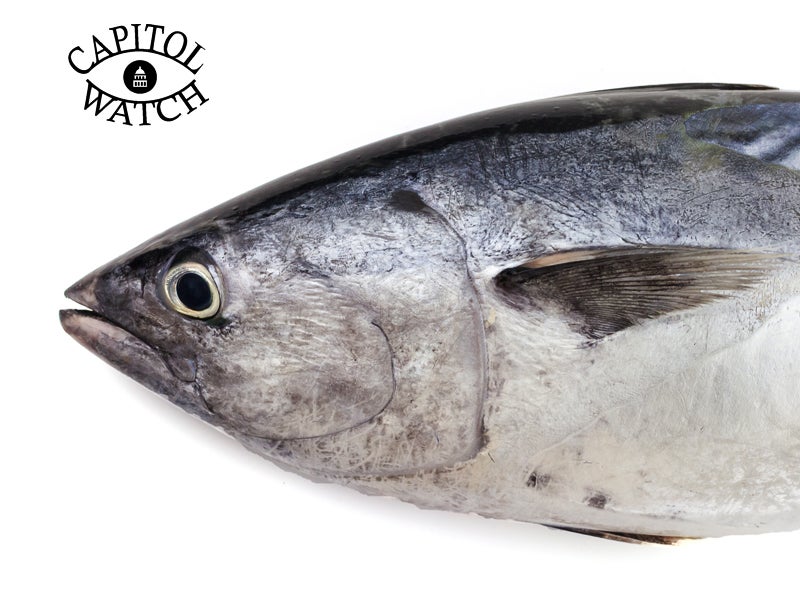A Scott Pruitt Appointment Means More Mercury in Our Fish
Mercury levels in tuna have finally started to decrease, but the good news may be short lived if Scott Pruitt is allowed to head the EPA and overturn important limits on power plant pollution.

This page was published 7 years ago. Find the latest on Earthjustice’s work.
Editor’s Note: On February 17, 2017, the Senate confirmed Scott Pruitt as the next administrator of the Environmental Protection Agency. Along a mostly party-line vote, Donald Trump’s pick to lead our nation’s top enforcer of environmental laws will take office despite his open hostility to bedrock air and water protections like the Clean Air Act and Clean Water Act, his refusal to turn over state documents and answer straightforward questions during his hearing process and his many conflicts of interest.
Late last year, Scientific American reported some good news. After rising relentlessly for years, the level of mercury contamination in Atlantic bluefin tuna has started to drop.
Why does this matter? When tuna eat prey animals packed full of mercury from the polluted water around them, this mercury accumulates in the tuna’s bodies. Eating tuna and other fish contaminated with mercury is how people get exposed to this toxin, which also builds up in their bodies over time.
When mercury accumulates in women’s bodies, their babies are exposed. In the U.S. alone, between 300,000 and 600,000 babies born each year are at risk of cognitive damage, including lower IQs, learning difficulty and behavioral problems, because of their exposure to mercury in the womb and when they nurse. So getting mercury out of fish and out of our diet is crucial.
All 50 states now publish warnings about the level of mercury and other toxins in the fish we eat and, in some saltwater fish like tuna, the contamination levels can be even worse. As Scientific American reports, mercury levels in Atlantic bluefin tuna had been going up for years. Scientists credit the startling reversal in this trend to a drop in mercury emissions from America’s coal-fired power plants. Part of this change is due to new EPA rules that limit power plants’ pollution.
Earthjustice has worked to control power plants’ toxic emissions for decades. We won court decisions that forced the EPA to put strict pollution limits in place and then blocked an attempt by the George W. Bush administration to derail them. Most recently, our organization has defended these pollution limits against court challenges brought by the coal industry and its allies. We represent both large and small environmental groups, and because power plant pollution disproportionately harms communities of color, we represent the NAACP as well. Now we can see scientific evidence that the rules we’ve worked for are starting to make our planet cleaner and our children safer.
And not just from mercury. These same limits cut power plants’ emissions of lead, arsenic and other toxic metals that spew out of their stacks. And the pollution control technology that power plants install to meet the new limits reduces their fine particle pollution—preventing heart and lung damage that previously caused between 4,200 and 11,000 premature deaths in the U.S. every year.
Not all the recent news is good, however. Litigation to eliminate EPA’s pollution limits is still ongoing, and the Trump administration’s nominee to head the EPA has been an enthusiastic part of that litigation from the time the rule was issued in 2012. As Oklahoma’s attorney general, Scott Pruitt sued to eliminate EPA’s limits on power plants’ emissions. If Pruitt had his way, power plants’ fine particle pollution would resume causing thousands of preventable deaths each year, and the health risks from exposure to the mercury, lead and other toxic pollutants they emit would continue unabated.
Pruitt is a bizarre choice by any president to head the Environmental Protection Agency. Knowing what he wants to do to the safeguards that protect families from pollution makes our job—and the job of every American who cares about public health, the environment and environmental justice—very clear.
Please join Earthjustice in the fight to protect our health and to support the fundamental right of all people to safe food and a clean, healthy environment.
ABOUT THIS SERIES
The 45th U.S. president, Donald J. Trump, is bent on gutting environmental protections, and—with a polluter-friendly Congress at his side—he’ll likely do everything he can to dismantle our fundamental right to a healthy environment. The Capitol Watch blog series will shine a light on these political attacks from Congress and the Trump administration, as well as the work of Earthjustice and our allies to hold them accountable.
Jim Pew is the director of clean air practice. He is based in Earthjustice's Washington, D.C. office. He received a B.A. in history from Stanford University, a M.A. in law from Cambridge University, and a J.D. from the University of Pennsylvania.
Established in 1989, Earthjustice's Policy & Legislation team works with champions in Congress to craft legislation that supports and extends our legal gains.
Earthjustice’s Washington, D.C., office works at the federal level to prevent air and water pollution, combat climate change, and protect natural areas. We also work with communities in the Mid-Atlantic region and elsewhere to address severe local environmental health problems, including exposures to dangerous air contaminants in toxic hot spots, sewage backups and overflows, chemical disasters, and contamination of drinking water. The D.C. office has been in operation since 1978.
